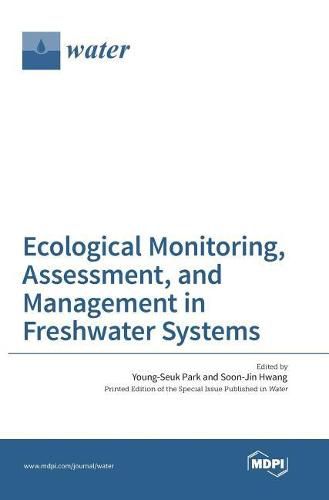Readings Newsletter
Become a Readings Member to make your shopping experience even easier.
Sign in or sign up for free!
You’re not far away from qualifying for FREE standard shipping within Australia
You’ve qualified for FREE standard shipping within Australia
The cart is loading…






This title is printed to order. This book may have been self-published. If so, we cannot guarantee the quality of the content. In the main most books will have gone through the editing process however some may not. We therefore suggest that you be aware of this before ordering this book. If in doubt check either the author or publisher’s details as we are unable to accept any returns unless they are faulty. Please contact us if you have any questions.
Today, sustainability of a healthy freshwater ecosystem and its associated ecosystem services are hot issues with ever-growing attention placed upon them. We are increasingly recognizing that they are crucial for the survival of the aquatic biota and human beings on our planet.
The efficient monitoring of water resources is fundamental for effective management of water quality and aquatic ecosystems. The first stage in sustainable ecosystem management is the evaluation of the current status of target ecosystems. Traditionally, and even today, physico-chemical parameters have mainly been used to evaluate the quality of water resources. However, they have a large limit to grab the wholeness of water system, particularly in the sense of ecosystem health and integrity, for which ecological monitoring should be based on biological factors. Various approaches are applicable to ecosystem health assessment at different levels of the biological hierarchy, from genes to ecosystems.
This Special Issue is designed to improve scientific understanding and strategies for sound aquatic ecosystem management and services for researchers, decision makers, and stakeholders.
Today, sustainability of a healthy freshwater ecosystem and its associated ecosystem services are hot issues with ever-growing attention placed upon them. We are increasingly recognizing that they are crucial for the survival of the aquatic biota and human beings on our planet.
The efficient monitoring of water resources is fundamental for effective management of water quality and aquatic ecosystems. The first stage in sustainable ecosystem management is the evaluation of the current status of target ecosystems. Traditionally, and even today, physico-chemical parameters have mainly been used to evaluate the quality of water resources. However, they have a large limit to grab the wholeness of water system, particularly in the sense of ecosystem health and integrity, for which ecological monitoring should be based on biological factors. Various approaches are applicable to ecosystem health assessment at different levels of the biological hierarchy, from genes to ecosystems.
This Special Issue is designed to improve scientific understanding and strategies for sound aquatic ecosystem management and services for researchers, decision makers, and stakeholders.
$9.00 standard shipping within Australia
FREE standard shipping within Australia for orders over $100.00
Express & International shipping calculated at checkout
This title is printed to order. This book may have been self-published. If so, we cannot guarantee the quality of the content. In the main most books will have gone through the editing process however some may not. We therefore suggest that you be aware of this before ordering this book. If in doubt check either the author or publisher’s details as we are unable to accept any returns unless they are faulty. Please contact us if you have any questions.
Today, sustainability of a healthy freshwater ecosystem and its associated ecosystem services are hot issues with ever-growing attention placed upon them. We are increasingly recognizing that they are crucial for the survival of the aquatic biota and human beings on our planet.
The efficient monitoring of water resources is fundamental for effective management of water quality and aquatic ecosystems. The first stage in sustainable ecosystem management is the evaluation of the current status of target ecosystems. Traditionally, and even today, physico-chemical parameters have mainly been used to evaluate the quality of water resources. However, they have a large limit to grab the wholeness of water system, particularly in the sense of ecosystem health and integrity, for which ecological monitoring should be based on biological factors. Various approaches are applicable to ecosystem health assessment at different levels of the biological hierarchy, from genes to ecosystems.
This Special Issue is designed to improve scientific understanding and strategies for sound aquatic ecosystem management and services for researchers, decision makers, and stakeholders.
Today, sustainability of a healthy freshwater ecosystem and its associated ecosystem services are hot issues with ever-growing attention placed upon them. We are increasingly recognizing that they are crucial for the survival of the aquatic biota and human beings on our planet.
The efficient monitoring of water resources is fundamental for effective management of water quality and aquatic ecosystems. The first stage in sustainable ecosystem management is the evaluation of the current status of target ecosystems. Traditionally, and even today, physico-chemical parameters have mainly been used to evaluate the quality of water resources. However, they have a large limit to grab the wholeness of water system, particularly in the sense of ecosystem health and integrity, for which ecological monitoring should be based on biological factors. Various approaches are applicable to ecosystem health assessment at different levels of the biological hierarchy, from genes to ecosystems.
This Special Issue is designed to improve scientific understanding and strategies for sound aquatic ecosystem management and services for researchers, decision makers, and stakeholders.